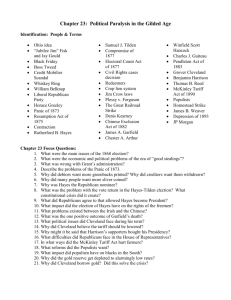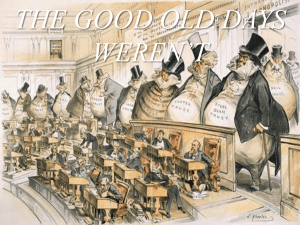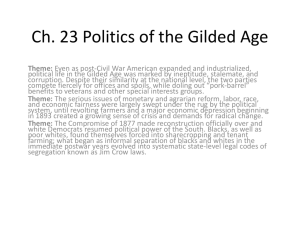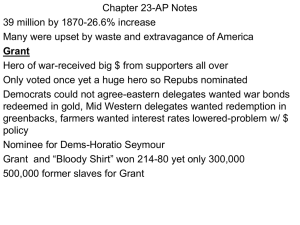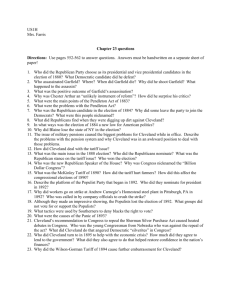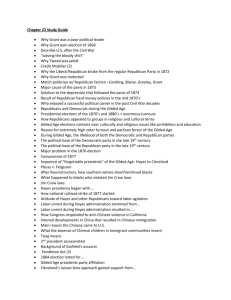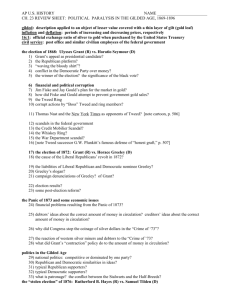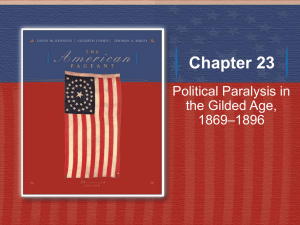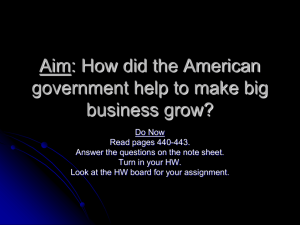Politics
advertisement
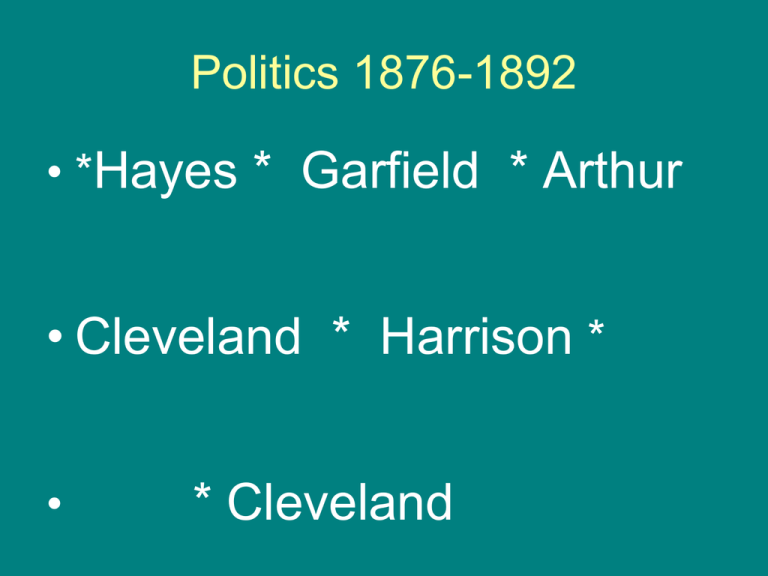
Politics 1876-1892 • *Hayes * Garfield * Arthur • Cleveland * Harrison * • * Cleveland Comparison of Parties of the late 1800’s Republicans Democrats • • • • • • • • • • • Civil War Veterans Big business Strongly patriotic Great plains farmers “party of morality” Refomers New England and upper mid-west • Mostly protestant Former states rightist Unions support Immigrants “party of personal liberty “ • Held voting edge in southern states • Strong Catholic support 1876 Election • Republican—Rutherford B. Hayes • Democrat—Samuel Tilden • Corruption—3 states turned in 2 separate results for the election • A “committee” decided who would be President Compromise of 1877 • Democrats agreed that if the Republicans would remove troops from the south and spend money in the south they would give the Presidency to Hayes • Hayes was horrified at the agreement— said he would never run for public office again Hayes Administration • Did not get much done • Made appointments based on merit— upset his own party when he fired Rep. Chester A. Arthur for skimming money from the customs office. That was considered by some to be “acceptable” graft. • During his administration questions of the “Spoils system” came up Spoils System • When a party got into office they used their political authority to make appointments to friends and supporters who could keep them in office. • Few offices were filled by capable people who were doing a good job. • Also called “Patronage” Stalwarts • Led by Roscoe Conklin • Wanted to stand by the practice of patronage • Beginning of a split in the Republican party Half-Breeds • Derogatory term given by the Stalwarts to those who wanted to reform the spoils system and appoint people who were qualified for jobs • Stalwarts claimed they were just trying to change the system to politically benefit themselves Election of 1880 • Republican Presidential Candidate— James Garfield • Republican V.P. Candidate—Chester A. Arthur • Democratic Presidential Candidate— Winfield Scot Garfield/Arthur Administration • 3 months after being elected James A. Garfield is shot and killed by Charles Guiteau—a crazed job seeker. • Chester A. Arthur shocks everyone and supports Civil Service Reform • Pendleton Civil Service Act—placed a few federal jobs under a Civil Service Commission— requiring that before someone can get that job they have to pass a test showing qualifications Election of 1884 • Republican Presidential Candidate—James G. Blaine • Democrat Presidential Candidate—Grover Cleveland • Republican party split—some reform minded Republicans felt they could not support Blaine and voted instead for Cleveland. They were called “mugwumps” • Very dirty campaign • Cleveland won Cleveland Administration • • • • Much labor unrest Interstate Commerce Commission Attempted to lower tariffs Attempted to control government spending Election of 1888 Issues---Tariffs—Vetrans Pensions—Labor issues Candidates—Republican—Bennjamin Harrison---Democratic—Grover Cleveland Big Business pulls support from Cleveland because he wants to lower tariffs. Vetrans want more pensions. Harrison wins Harrison Administration • McKinnley Tarrif—raises tarrifs dramatically—slows down economy • Increase in Vetrans pensions—decreased nations surplus • Sherman Anti-trust Act—feeble attempt to control monopolies—vaguely worded— difficult to enforce Election of 1892 • Economic issues take the forefront---Panic of 1892 • Farmers create the Populist party to try to get their issues in the forefront. • Republican—Harrison • Democrat—Cleveland • Populist—James B. Weaver • Socialist—Eugene Debs
